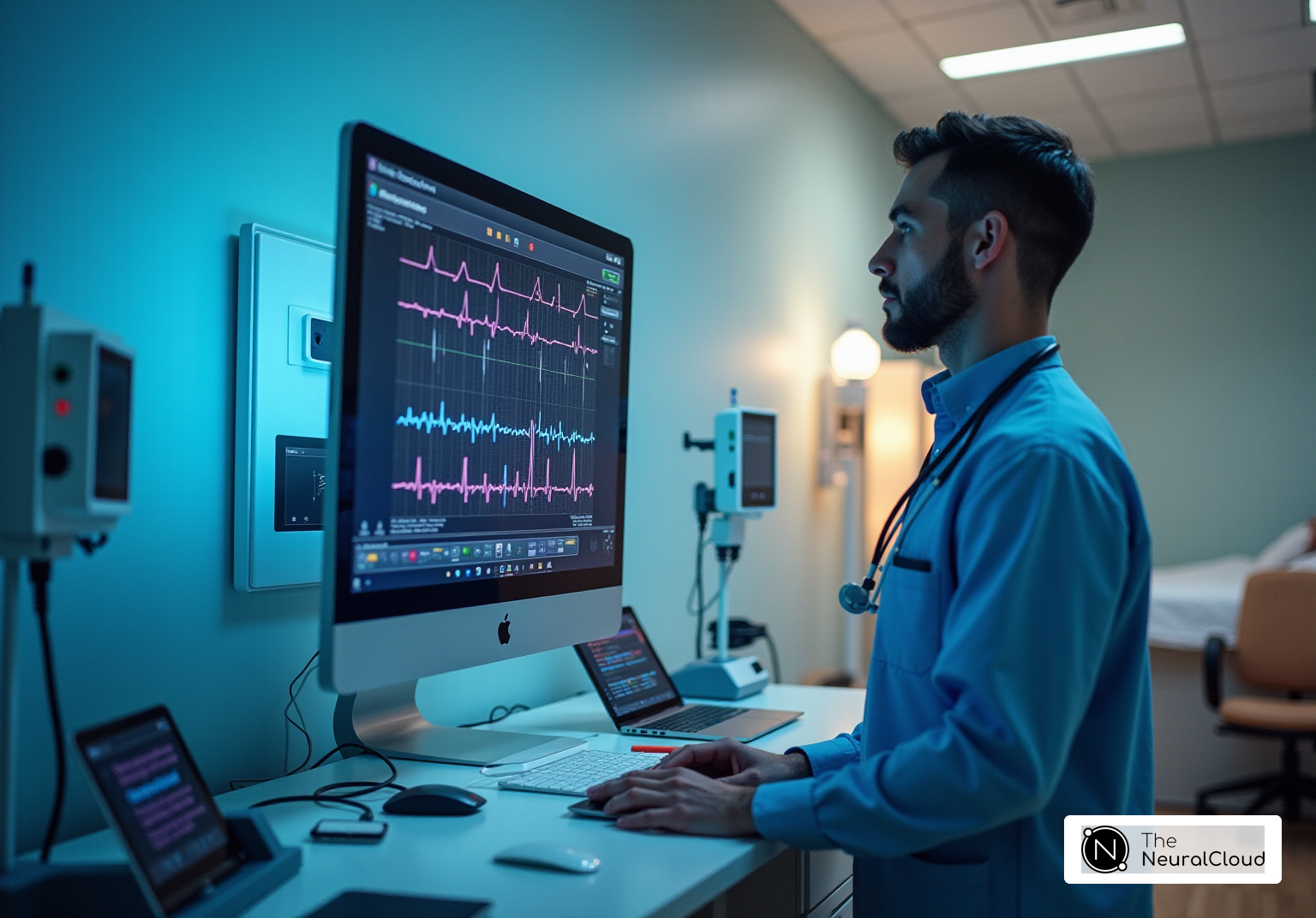Overview
The article provides an overview of the challenges faced in ECG analysis, focusing on strategies that health tech developers can implement to enhance ECG readings. It emphasizes the integration of advanced technologies and best practices. Key features include:
- The utilization of AI algorithms
- Ensuring proper equipment setup
- Training healthcare professionals
These strategies are designed to improve diagnostic accuracy and patient outcomes through clearer ECG analysis. The advantages of these approaches are significant, as they lead to enhanced clarity in ECG readings, ultimately benefiting healthcare professionals and patients alike.
Introduction
The evolution of electrocardiogram (ECG) technology is reshaping cardiovascular diagnostics, offering health tech developers unprecedented opportunities to enhance patient care. By implementing innovative strategies and leveraging advanced AI solutions such as Neural Cloud Solutions' MaxYield™, developers can significantly improve the accuracy and reliability of ECG readings.
However, as the demand for precise cardiac assessments rises, developers face the challenge of navigating the complexities of ECG interpretation to ensure optimal outcomes for patients. This article explores ten essential strategies designed to elevate ECG readings, ultimately transforming the landscape of cardiac health management.
Neural Cloud Solutions: MaxYield™ for Enhanced ECG Clarity
Neural Cloud Solutions' platform is at the forefront of revolutionizing ECG analysis through that automate and enhance the clarity of ECG signals. With the ability to process over 200,000 heartbeats in under five minutes, , effectively isolating and labeling critical features such as P-waves, QRS complexes, and T-wave intervals. By , this innovative technology empowers healthcare professionals to make informed decisions based on precise cardiac insights, ultimately leading to .
Recent advancements in AI ECG analysis have shown significant improvements in . For example, studies indicate that of healthcare professionals, with a reported 4.9% increase in rhythm classification accuracy when utilizing combined viewing formats of raw and denoised ECG signals. This integration not only boosts confidence scores among clinicians but also reduces the proportion of undiagnosable data, highlighting the in refining ECG readings.
What sets this technology apart from conventional ECG interpretation methods is its ability to quickly identify ECG waves from recordings with considerable noise and artifacts, recovering previously hidden portions of extensive Holter, 1-Lead, and patch monitor recordings. Successful implementations of automated ECG analysis platforms, such as the one mentioned, have been recognized for their capacity to . Cardiologists have noted the significant impact of these technologies, emphasizing their potential to reduce misdiagnoses and improve care management. As AI continues to develop, its integration into ECG analysis is poised to redefine diagnostic processes, ultimately enhancing cardiovascular health management. For health tech developers, utilizing MaxYield™ can substantially , leading to better outcomes for individuals.
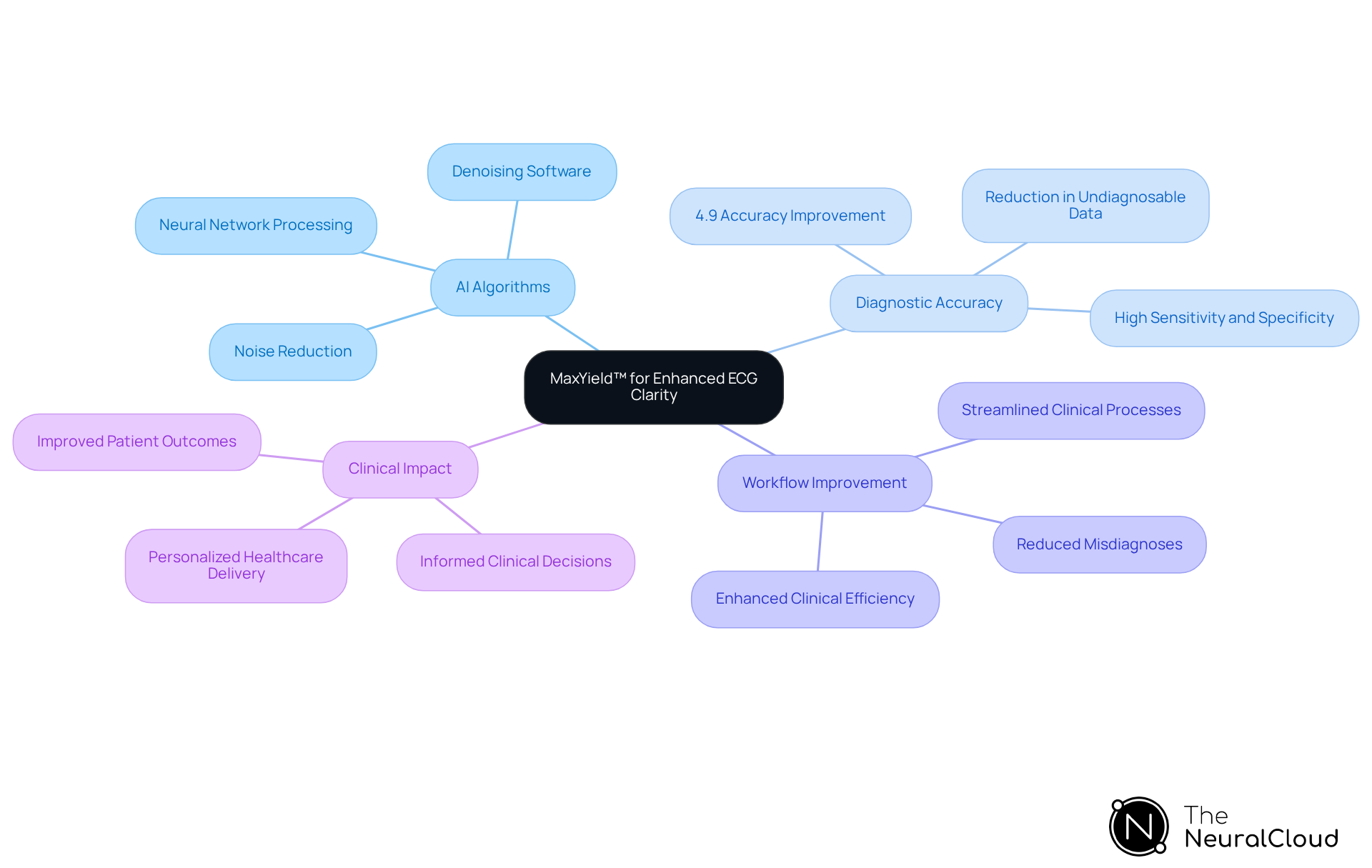
Ensure Proper Equipment Setup for Accurate ECG Readings
Achieving is critical, starting with meticulous equipment setup. Ensuring that all connections are secure and that the ECG machine is is essential. Calibration should follow a systematic approach, which includes:
- Verifying machine settings
- Applying test signals
- Making necessary adjustments based on the patient's specific needs
Regular maintenance inspections are vital to prevent that could undermine the quality of information. For example, can mitigate errors caused by equipment drift, ensuring consistent performance.
Studies indicate that can lead to misclassifications of arrhythmia. Factors such as operator error and anatomical variations play significant roles in these misclassifications. Furthermore, utilizing can reduce triboelectric noise, thereby improving reliability. Integrating , such as those offered by Neural Cloud Solutions, can greatly enhance the ECG workflow. These innovations automate routine tasks and manage greater volumes of data in shorter periods.
Documenting is crucial for maintaining optimal machine performance over time. By adhering to these best practices and leveraging innovative solutions, can significantly enhance the reliability of ECG readings. This ultimately leads to improved care for individuals, ensuring that healthcare professionals can rely on accurate data for better patient outcomes.
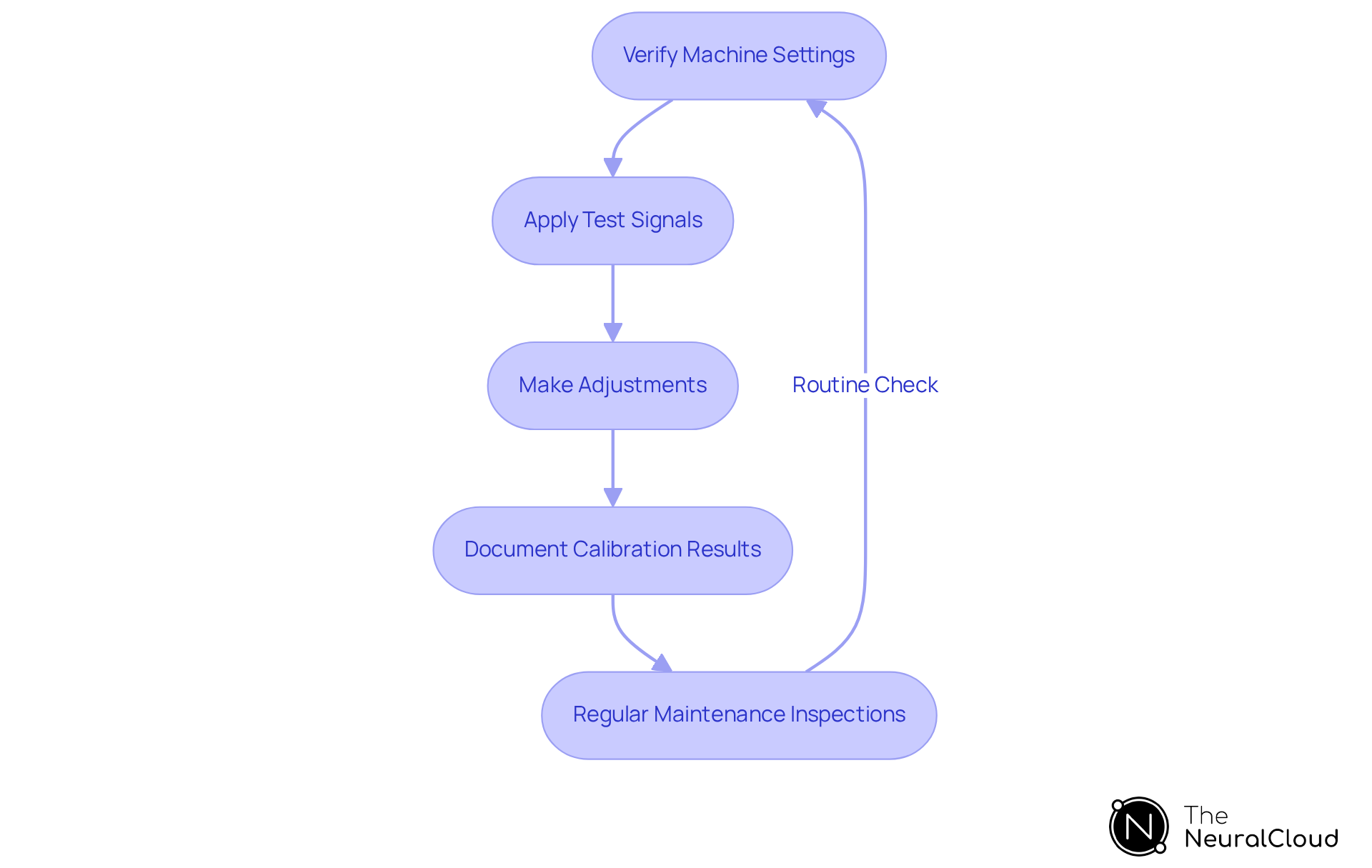
Prepare Patients Effectively to Improve ECG Data Quality
Effective preparation of individuals is crucial for , especially when using like MaxYield™. Ensuring that the individual's skin is clean and devoid of oils, lotions, or creams is paramount, as these substances can significantly hinder electrode adhesion. not only facilitates improved contact but also minimizes the risk of , which can lead to inaccurate readings.
Additionally, guiding individuals to remain still and calm during the procedure is essential for reducing motion artifacts. Stress or anxiety can elevate heart rates or induce irregular rhythms, potentially mimicking heart issues. Therefore, fostering a calm environment and promoting relaxation techniques can further .
By adhering to these preparation guidelines, for accurate ECG readings, which ultimately results in more reliable cardiac assessments. Furthermore, leveraging the , such as its X-Factor Signal Mapping, can enhance the clarity and diagnostic yield of ECG analysis, as evidenced by in real-world applications.
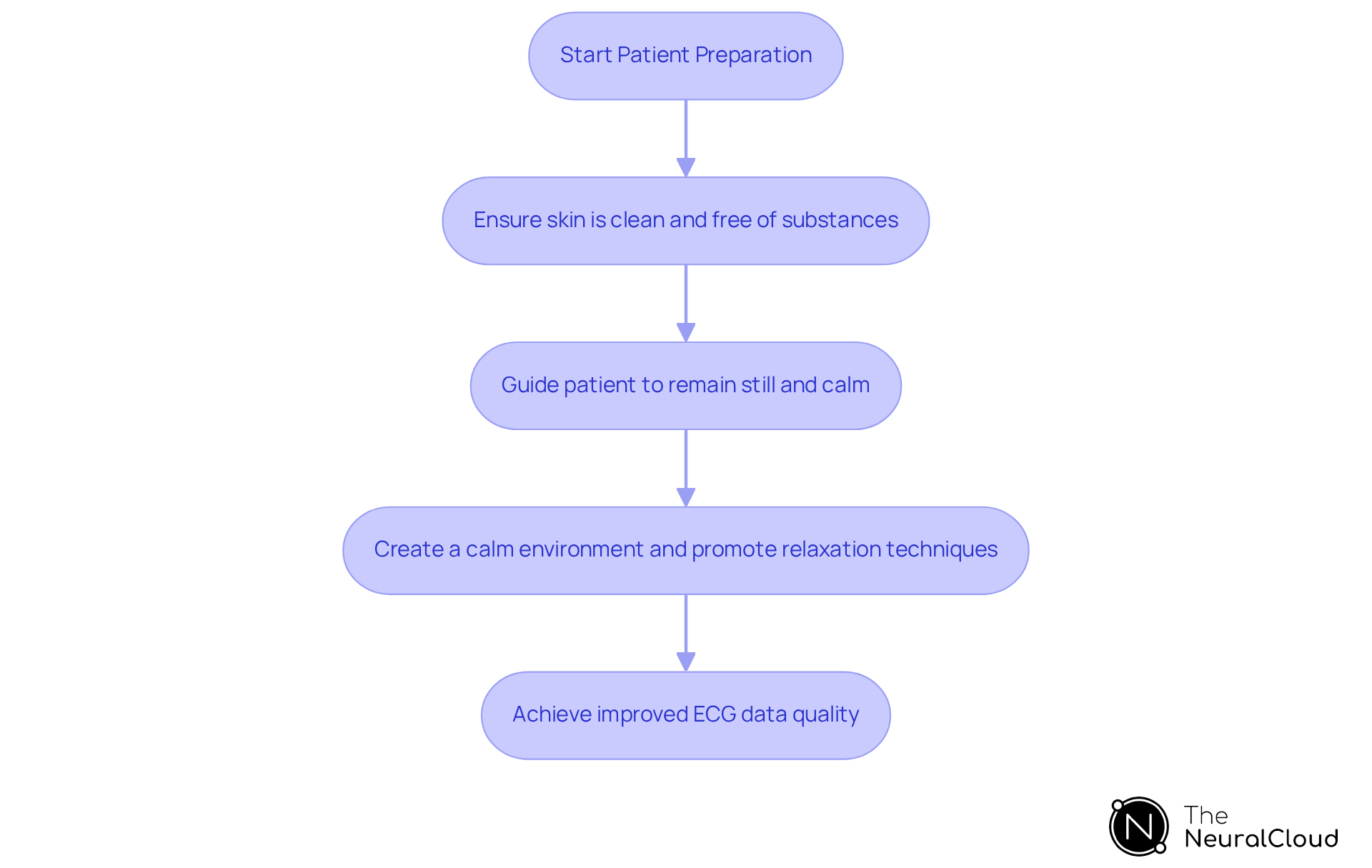
Understand ECG Waveforms for Better Interpretation
Understanding is essential for . Each component—the —provides crucial insights into the heart's electrical activity. The P wave reflects atrial depolarization, the QRS complex indicates ventricular depolarization, and the T wave represents ventricular repolarization. Misinterpretations of these components can lead to significant clinical consequences. Studies show that:
- 22.3% of participants exhibited minor
- 4.58% had major ECG readings abnormalities, often linked to cardiovascular risk factors such as hypertension and diabetes.
Developers must ensure their systems effectively display these waveforms, facilitating quick identification of abnormalities. have demonstrated high accuracy in (LVH) and atrial fibrillation (AF). Some algorithms have achieved an area under the curve (AUC) of 0.93 in identifying LV dysfunction. Such capabilities underscore the importance of integrating in ECG systems to enhance clinical decision-making.
Furthermore, comprehending typical ECG waveform irregularities—such as major ST-T changes and minor Q-wave abnormalities—can significantly influence outcomes for individuals. For instance, the prevalence of is often associated with increased . This highlights the need for routine ECG screenings even in low-risk populations. By prioritizing , health tech developers can contribute to enhanced cardiac health monitoring and care.
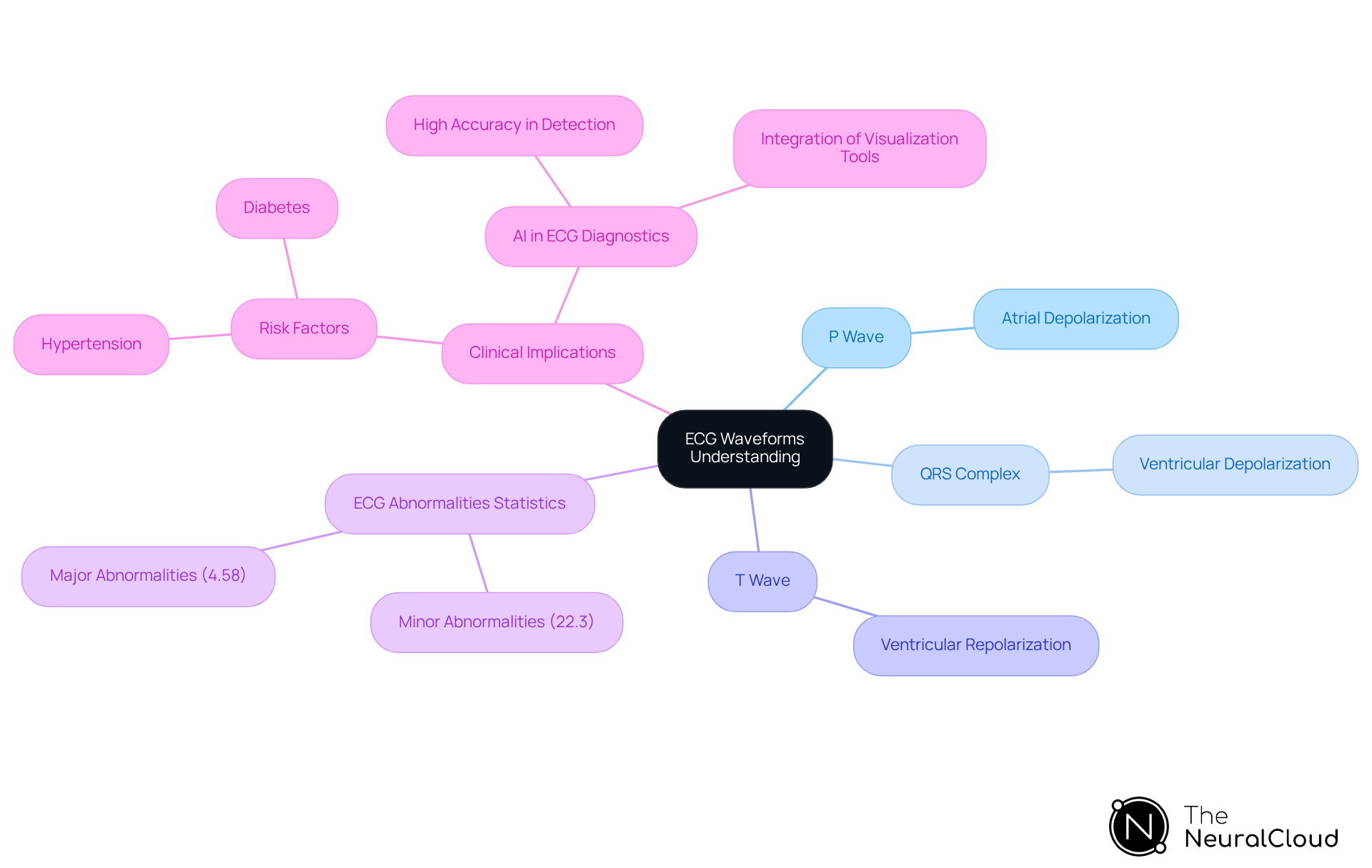
Implement Noise Reduction Techniques for Clearer ECG Signals
Implementing is crucial for achieving . effectively eliminates low-frequency noise, which can obscure critical cardiac information. This method has been shown to significantly improve the , enhancing the overall clarity of the ECG signals. Furthermore, are essential as they dynamically adjust to varying noise levels in real-time, ensuring consistent signal clarity. By incorporating these into platforms for analyzing ECG readings, such as ' offerings, developers can enhance the reliability and precision of the information gathered.
MaxYield™'s adaptive algorithm evolves with each application, constantly enhancing . This iterative improvement ultimately results in better outcomes for individuals. The platform's ability to detect and categorize essential information, even in recordings with significant noise and artifacts, positions it as a vital tool for healthcare professionals. By leveraging these advanced filtering techniques, users can expect in ECG readings analysis, leading to more informed clinical decisions.
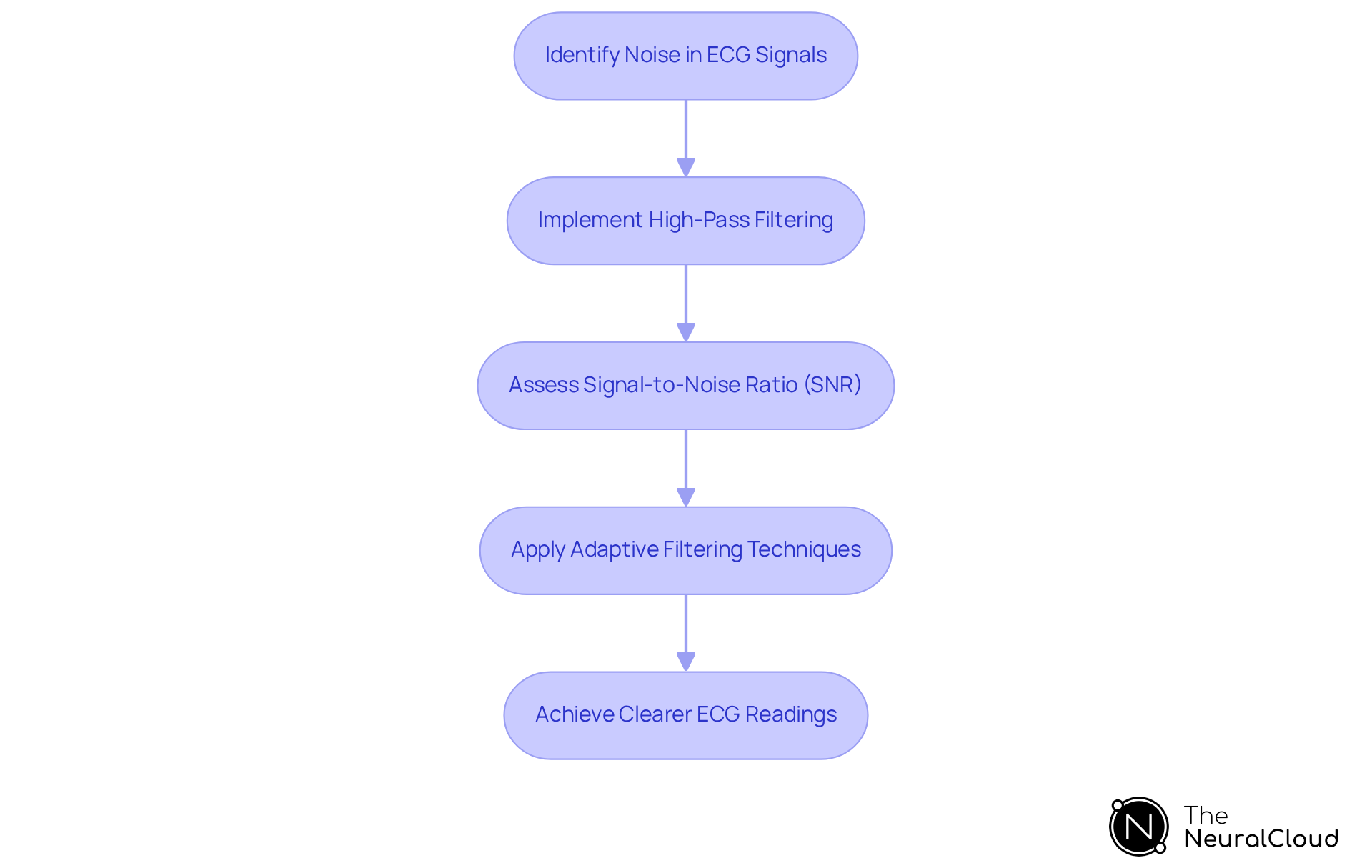
Utilize Continuous Monitoring for Comprehensive ECG Analysis
Continuous cardiac monitoring technology significantly enhances the analysis of by capturing that standard ECG tests often overlook. This advanced method facilitates real-time data gathering, providing healthcare professionals with a more detailed understanding of an individual's . For instance, research indicates that individuals with implantable cardiac monitors (ICMs) experience a median duration to the initiation of antiarrhythmic drug therapy of only 36 days, compared to 46 days for those without such monitoring. This rapid response highlights the critical role of in enabling .
Furthermore, integrating capabilities into ECG readings can lead to . Research demonstrates that can enhance ongoing decision-making in atrial fibrillation (AF) management, ultimately reducing AF-related morbidity and mortality. By capturing transient events, such as brief episodes of arrhythmia, developers can equip clinicians with the necessary tools to make informed decisions based on . As emphasized by the American Heart Association, understanding and addressing these transient events is essential for , reinforcing the need for innovative solutions in ECG readings.
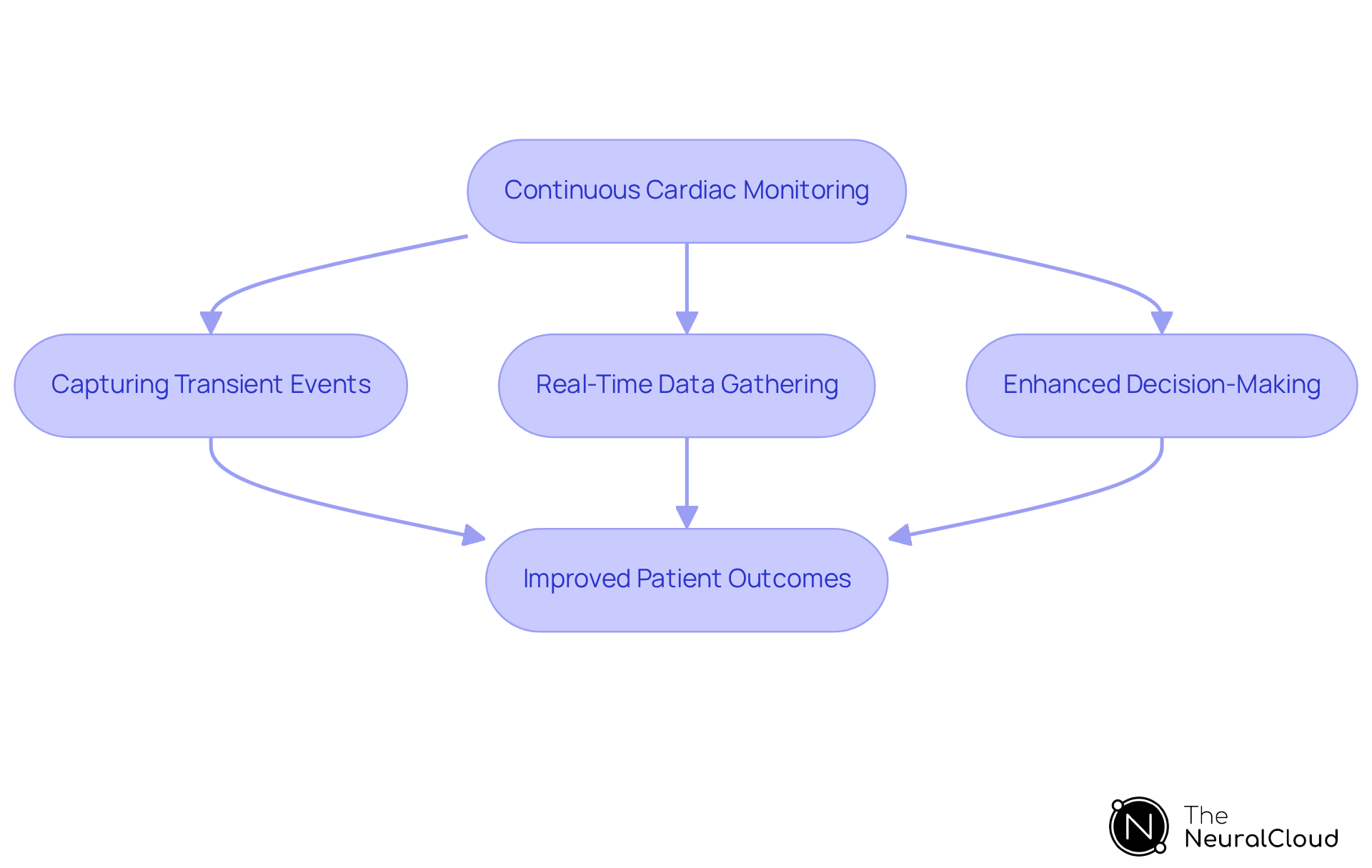
Train Healthcare Professionals for Enhanced ECG Interpretation Skills
Training healthcare professionals in ECG readings is vital for enhancing and improving patient outcomes. Healthcare providers frequently encounter challenges with , with median accuracy rates plummeting to as low as 54% across all training levels prior to interventions. To address these issues, developers must prioritize the creation of that explore the intricacies of ECG readings analysis. Among these resources, ' stands out. This innovative platform rapidly labels P, QRS, and T Wave onsets, offsets, and time-series intervals, allowing healthcare providers to analyze more data in less time while ensuring clear data sets and clean signals.
The MaxYield™ platform offers several key features that significantly enhance the analysis of ECG readings. By leveraging , it provides healthcare professionals with the tools necessary to accurately interpret ECG readings. The platform's capabilities not only streamline the analysis process but also empower practitioners to make more informed decisions. Evidence indicates that workshops, online courses, and simulation-based training can effectively enhance skills in interpreting ECG readings, resulting in a median accuracy increase to 67% post-training across all levels. Furthermore, the alarming statistic that practitioners misinterpret 25% to 30% of emergency ECG readings highlights the urgent need for .
By utilizing Neural Cloud Solutions' continuous learning model, which evolves with each use to improve diagnostic yield, targeted educational interventions can drastically reduce , including misdiagnosing arrhythmias and ischemic features prevalent in clinical practice. Implementing comprehensive training strategies that incorporate the MaxYield™ platform can equip healthcare professionals with the necessary competencies to accurately interpret ECG readings. Ultimately, this advancement in training will lead to by addressing the critical challenges faced in interpreting ECG readings.
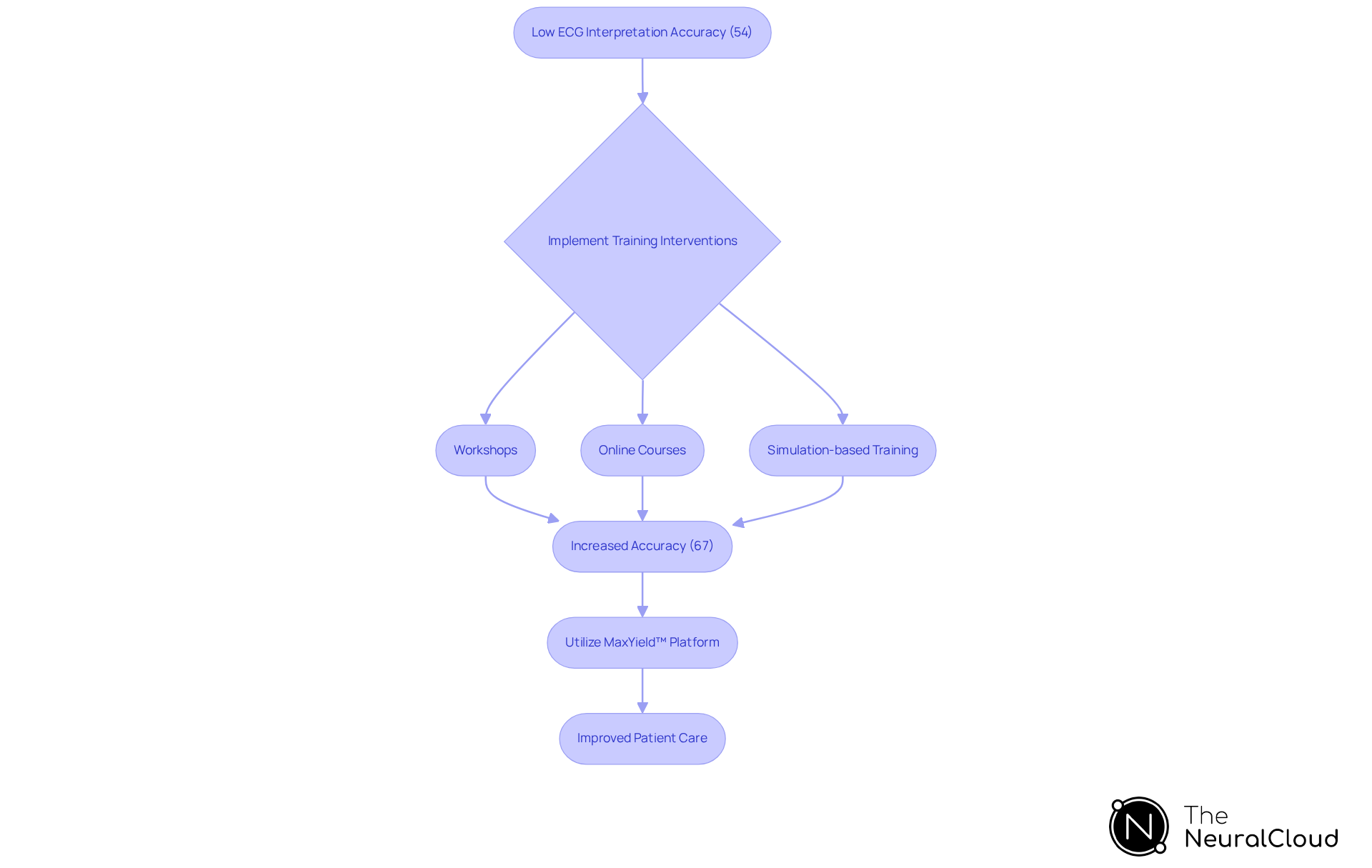
Calibrate ECG Machines Regularly to Ensure Accurate Readings
Frequent calibration of ECG devices is essential for ensuring , particularly with advanced systems. Calibration serves as a reference point for voltage and time measurements, which is vital for diagnosing cardiac conditions. User manuals emphasize that following proper calibration procedures maximizes the effectiveness of and wave recognition capabilities.
Developers are encouraged to implement reminders and protocols for , which helps maintain the integrity of ECG data. This proactive strategy not only but also ensures that operate at peak efficiency, ultimately enhancing the .
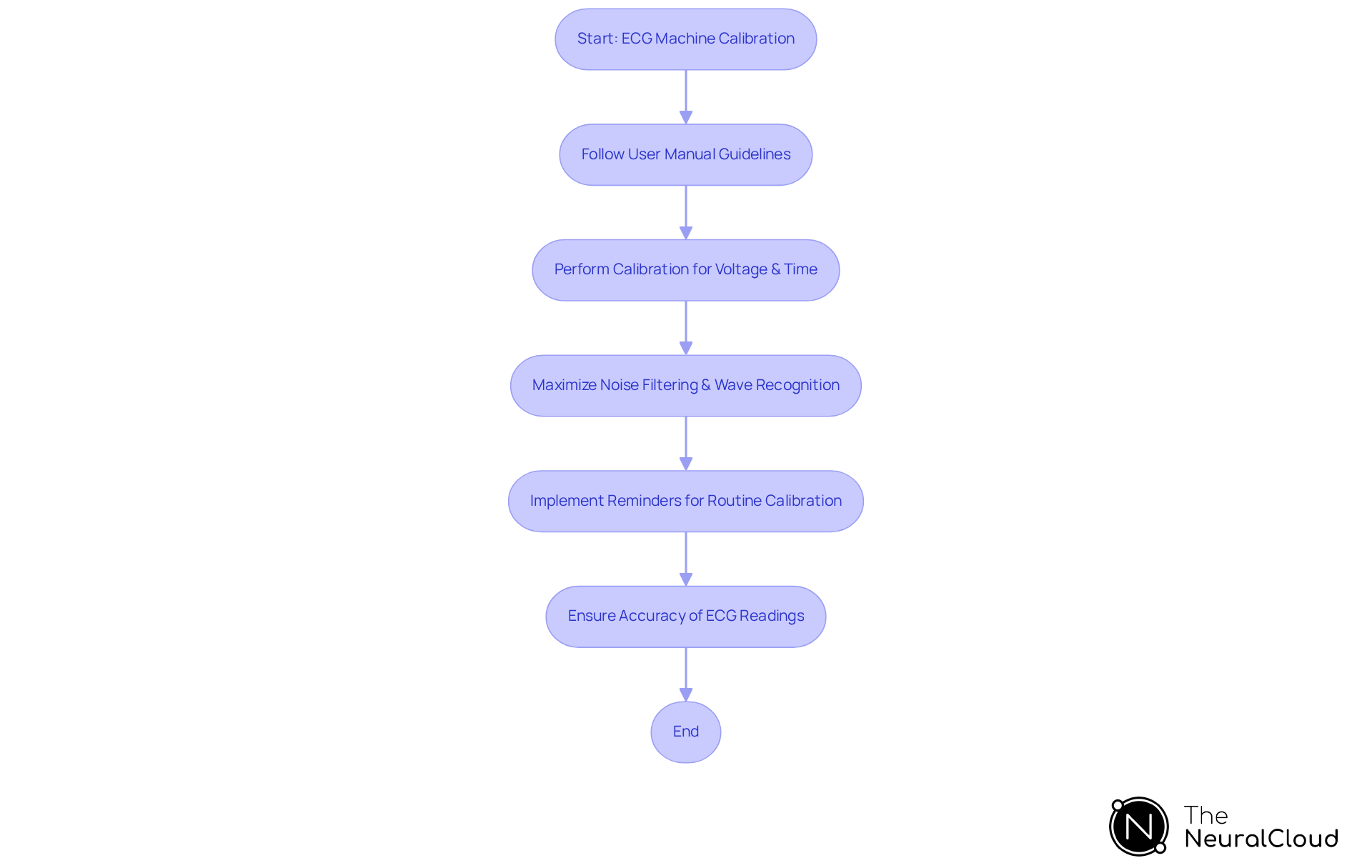
Integrate Advanced Algorithms for Efficient ECG Analysis
Integrating into platforms for analyzing ECG readings addresses significant challenges in efficiency and . ' exemplifies this by employing advanced noise filtering and adaptive algorithms that evolve with each use. As a result, it significantly improves diagnostic yield. This innovative approach enables the , even in recordings affected by and artifacts, such as baseline wander and muscle interference.
Machine learning algorithms play a crucial role by , which streamlines the interpretation process. For instance, a deep neural network (DNN) trained on over 8.5 million ECGs has demonstrated impressive sensitivity of 86.3% and specificity of 85.5% in diagnosing left ventricular systolic dysfunction (LVSD). Such performance underscores the potential of AI to enhance diagnostic outcomes while simultaneously reducing analysis time.
Moreover, the implementation of has yielded remarkable results, achieving an accuracy of 99.71% in predicting cardiovascular diseases. These advancements not only clarify ECG signals but also empower healthcare professionals to make informed decisions swiftly. By utilizing these technologies, developers can equip clinicians with tools that enhance diagnostic precision and , ultimately leading to improved care for individuals, particularly through accurate ECG readings.
Expert views emphasize the significance of these advancements; the incorporation of AI in analyzing ECG readings is expected to be vital in recognizing high-risk individuals and facilitating prompt interventions. As the healthcare landscape evolves, the adoption of advanced algorithms in ECG platforms, such as Neural Cloud Solutions' MaxYield™, will be pivotal in , diagnostic efficiency, and outcomes. Addressing challenges such as noise and artifacts in ECG analysis is essential for the successful implementation of these advanced algorithms.
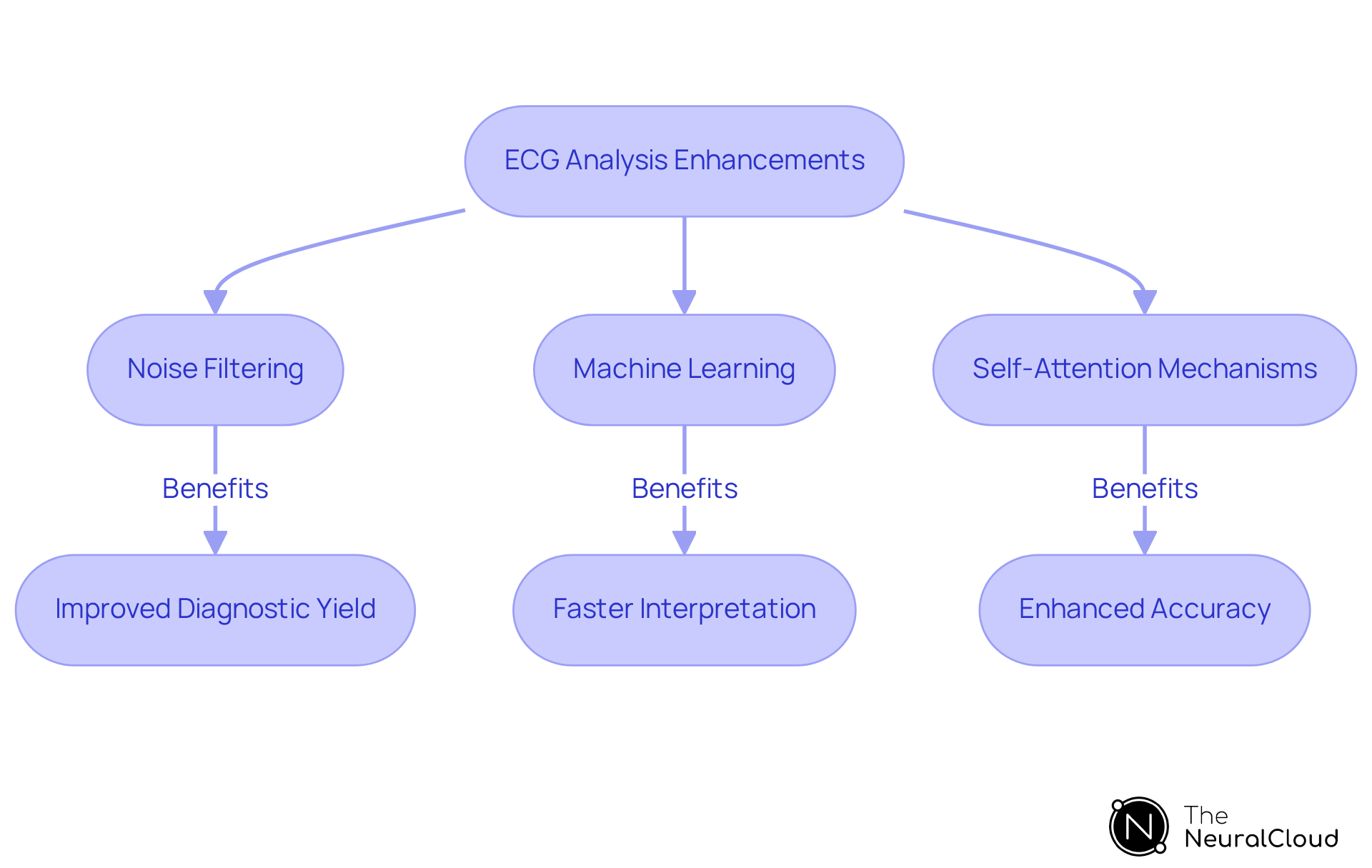
Review ECG Data Promptly for Timely Clinical Decisions
Prompt review of is essential for . should prioritize designing platforms that facilitate rapid access to ECG readings, enabling healthcare professionals to respond swiftly to critical findings. The implementation of significantly enhances the responsiveness of , ultimately leading to improved .
Research shows that effective can and elevate the overall quality of care, as they promote ECG readings. By leveraging , developers can equip clinicians with the necessary tools to make informed decisions, thereby optimizing patient outcomes.
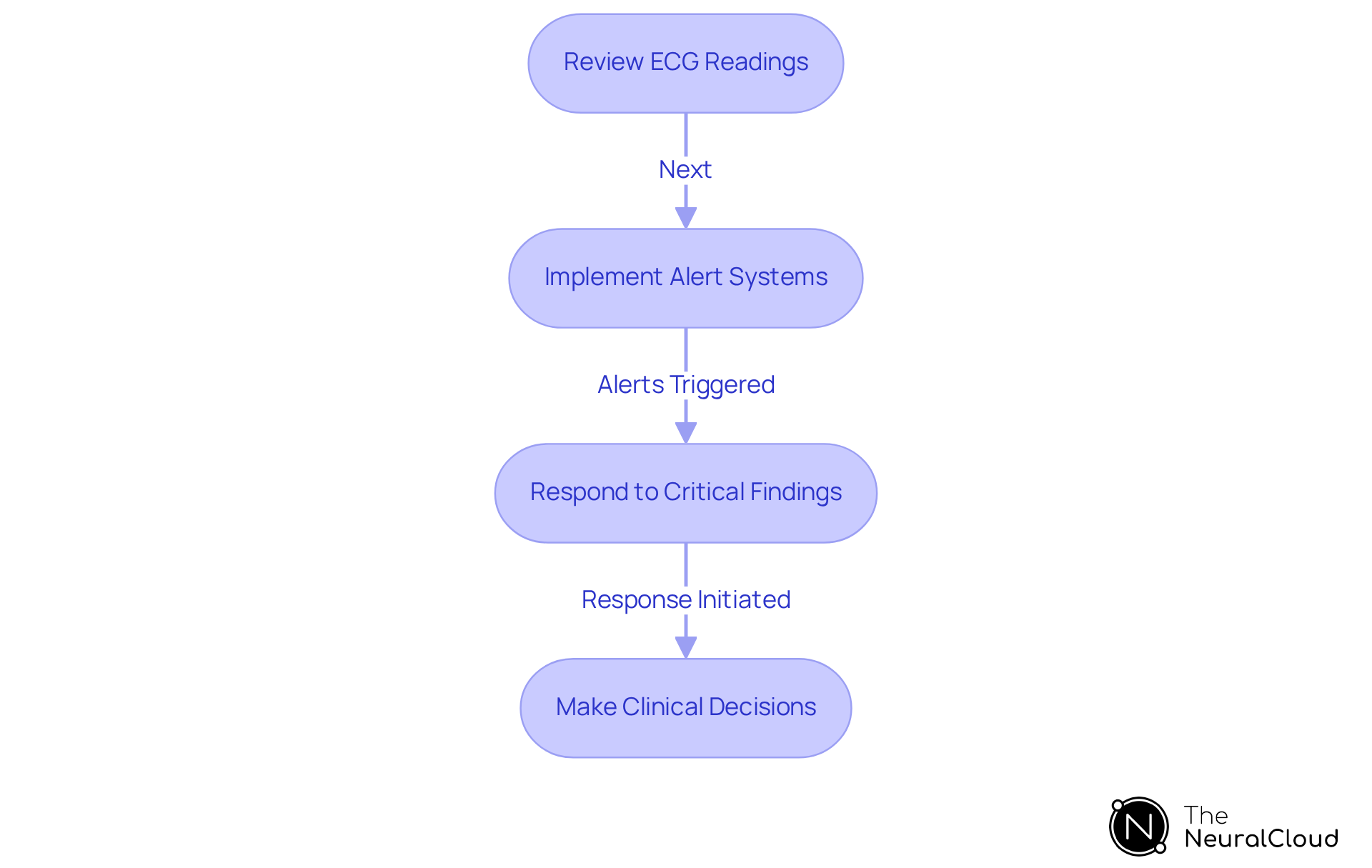
Conclusion
The integration of advanced technologies and best practices in ECG analysis is crucial for enhancing diagnostic accuracy and improving patient outcomes. Leveraging innovations such as Neural Cloud Solutions' MaxYield™ platform allows health tech developers to significantly elevate the quality of ECG readings. This platform streamlines the analysis process, empowering healthcare professionals with precise cardiac insights, ultimately leading to better clinical decisions.
Key strategies for effective ECG analysis include:
- Ensuring proper equipment setup
- Effective patient preparation
- Implementing noise reduction techniques
A thorough understanding of ECG waveforms and the utilization of continuous monitoring further enhance comprehensive cardiac assessments. Additionally, training healthcare professionals in ECG interpretation and regularly calibrating machines are essential steps in maintaining the integrity of ECG data.
In the rapidly evolving healthcare landscape, embracing these strategies is vital for fostering improved cardiovascular health management. By prioritizing accuracy and efficiency in ECG readings, developers and healthcare providers can collaborate to enhance patient care and safety. The ongoing commitment to innovation and education in this field will benefit practitioners and significantly impact the lives of individuals relying on accurate cardiac assessments.
Frequently Asked Questions
What is MaxYield™ and how does it enhance ECG analysis?
MaxYield™ is a platform developed by Neural Cloud Solutions that utilizes advanced AI algorithms to automate and improve the clarity of ECG signals. It processes over 200,000 heartbeats in under five minutes, providing detailed beat-by-beat analysis and effectively isolating critical features such as P-waves, QRS complexes, and T-wave intervals.
How does MaxYield™ address challenges in ECG readings?
MaxYield™ addresses challenges posed by noise and signal artifacts, allowing for the recovery of previously hidden portions of recordings and enhancing the interpretive capabilities of healthcare professionals. This leads to improved diagnostic accuracy and efficiency.
What improvements have been observed with the use of AI in ECG analysis?
Studies have shown a 4.9% increase in rhythm classification accuracy when using combined viewing formats of raw and denoised ECG signals, boosting clinician confidence and reducing undiagnosable data.
Why is proper equipment setup important for accurate ECG readings?
Proper equipment setup is essential for accurate ECG readings as it ensures secure connections and proper calibration of the ECG machine. This includes verifying machine settings, applying test signals, and making adjustments based on patient needs, which helps prevent misclassifications and technical issues.
What role does patient preparation play in ECG data quality?
Effective patient preparation is crucial for enhancing ECG data quality. Ensuring the skin is clean and free of oils, lotions, or creams improves electrode adhesion and minimizes signal interference. Additionally, guiding patients to remain still and calm reduces motion artifacts that can lead to inaccurate readings.
How can healthcare providers optimize conditions for accurate ECG readings using MaxYield™?
Healthcare providers can optimize conditions by adhering to preparation guidelines such as ensuring clean skin and promoting a calm environment. Utilizing advanced features of MaxYield™, like X-Factor Signal Mapping, can further enhance the clarity and diagnostic yield of ECG analysis.
What benefits do automated ECG analysis platforms provide to healthcare professionals?
Automated ECG analysis platforms streamline workflows, enhance clinical efficiency, reduce misdiagnoses, and improve care management, allowing healthcare professionals to rely on accurate data for better patient outcomes.
